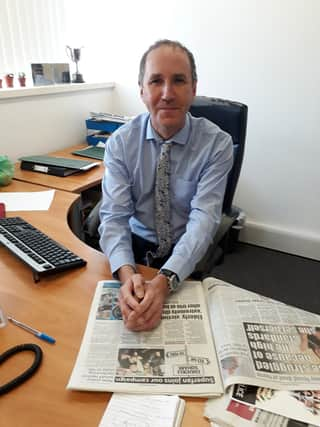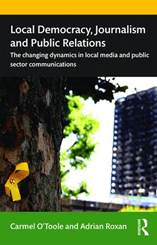Democracy under threat


THE Rotherham Advertiser features heavily in a new book which investigates how cuts in the communications industry have hit local democracy.
Issues such as the town’s CSE scandal, the Grenfell Tower disaster and the controversial council felling of trees in Sheffield are covered in Local Democracy, Journalism and Public Relations, which explores how reductions in local authority media teams and the decline in newspapers have taken their toll on reporting.
Advertisement
Hide AdAdvertisement
Hide AdThe book (below), by Sheffield Hallam University PR lecturers Carmel O’Toole and Adrian Roxan, features interviews with Times journalist Andrew Norfolk, former Advertiser reporter and council communications chief Eileen Brooks and current editor Andrew Mosley, among others.
The authors say the “nose for news” has been downgraded and local journalists, once the champions of public interest coverage, are a force much diminished. The book asks what is lost to local democracy as a result? And what does it mean when no one is holding the country’s public spenders to account?
Times chief investigative reporter Mr Norfolk, who broke the story of the Rotherham CSE scandal, says in the book that he was listening to a radio report from Manchester Crown Court at the end of a trial where nine men had been convicted of offences against a 14-year-old girl.
He said: “Peter (the presenter) was obviously saying ‘this sounds absolutely horrific, these offences have been committed in Rochdale and in Manchester against this one girl, who were these guys, did they have anything in common?’ And there was this embarrassed silence on the end of the line from the reporter.”
Advertisement
Hide AdAdvertisement
Hide AdWhen Mr Norfolk got back to his office he checked whether his personal hunch about the common factor was correct: “It kept overwhelmingly being Muslim names, and men. And sure enough it was, and the next day I sent this long email to my news editor and said look you’ve got to give me some time, and that was in early September 2010.”
After years of research and meetings, in September 2012 The Times presented the horrific facts about what was happening in Rotherham, but not until after having sent a 4,000 word email to the council and South Yorkshire Police press offices outlining evidence and plans for publishing — receiving in response not much more than simple denials.
The book says that when asked in the absence of scrutiny what is lost to community in terms of public interest, Mr Norfolk replied: “I guess it’s the stuff we actually don’t know about because there aren’t any journalists any more to actually uncover it. I fear that local authorities, for example, become so accustomed to not being scrutinised and not being held to account.


“I’m afraid to say that particularly applies in areas of this country where one political party has an overwhelming dominance, whether that is Labour or Conservative, but obviously because my years in regional journalism were in the north it tended to be Labour, and in Doncaster and Rotherham there was barely an opposition councillor. And if the local media are no longer there to go through the agendas and I know you sometimes get members of the public who take a particular interest in local democracy and try to raise a fuss, but if there’s no outlet for scrutiny and opposition and questions and being put on the spot, when you’re actually about to take a decision you no longer need to consider is anybody going to ask any tricky questions about this, then I think the danger’s self-evident.”
Advertisement
Hide AdAdvertisement
Hide AdAdvertiser editor Andrew Mosley said staffing was an issue for a number of reasons and added: “There was extra pressure on the media through websites to start with, then other forms of social media coming in with Facebook, Twitter etc. And at the same point pressure on jobs, so you tend to find that owners of newspapers, specifically the larger groups, want to reduce staffing but get more out of them, which I think stretches your ability to provide a quality product, and I think that’s evident in some of the products that are put out by the larger newspaper groups who’ve cut staff massively, maybe sent their subbing out to subbing hubs, maybe Newport, so you’ve got people in Newport subbing a paper in Yorkshire.
“I think they maybe don’t have the commitment to that paper or the knowledge of the area, and I think that’s evident in the quality of what you get, but yet you’ve got newspaper owners and chief execs expecting the same results. And that’s put a lot of pressure on journalists, and I think the people who are running papers as opposed to people who were running them 25 years ago when it (that person) might have been the editor, don’t really understand what a newspaper is about and why people bought it in the first place.
“In a previous place I’ve worked they were closing down the libraries and the story we ran was that there would be a library service within a mile of every reader because they were doing mobile library services. It’s not quite what people wanted though is it, but it was the council spin, and I don’t think we’ve ever gone down that route here. People still say ‘oh yeah the Advertiser is in the council’s pocket’, you’re going to get people saying that, certain local self-styled political websites will tell you that.
“Every time you have a front page that’s not about the child sexual exploitation, ‘oh the Advertiser’s gone with this, they’re letting them off the hook’, and I think have you not read the paper, have you not seen it’s been on the front page (above) 28 times in the past two years or whatever?
Advertisement
Hide AdAdvertisement
Hide Ad“I used to find it more frustrating than I do now, I used to want to write back to these people and say actually have you read this page, that page, that page and that page? The council didn’t particularly like us before, and maybe that means you’re striking the right balance if you’ve got people who think you’re in their pocket but yet the council (Riverside offices below) don’t like you.”
The book says the changing dynamics in local media and public sector communications exposes the increasing challenge of holding local politicians to account as swingeing government cuts hit council media departments and local papers close in response to the shift to digital news.
Carmel said: “The result is less information and consultation with local residents.
“At the same time the UK has seen the decline and disappearance of many local newspapers and journalists, who have traditionally scrutinised public sector spenders. This toxic combination threatens the ability of the media and public to hold local politicians to account.
Advertisement
Hide AdAdvertisement
Hide Ad“The ‘nose for news’ has been downgraded and local journalists, once the champions of public interest coverage, are a force much diminished, working harder than ever before, with fewer people and chasing online hits, damaging local democracy as a result, with no one holding those in power to account.”
l Local Democracy, Journalism and Public Relations by Carmel O’ Toole and Adrian Roxan is available from https://www.routledge.com